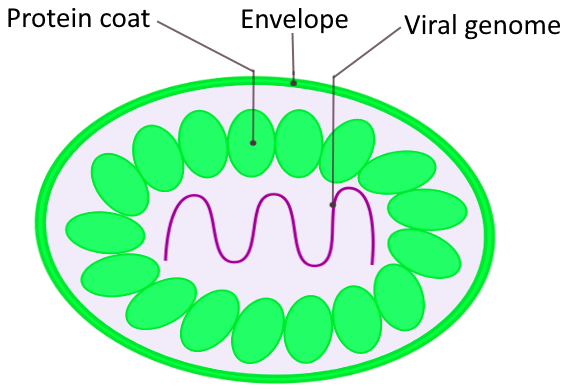
Write a short paragraph on the harmful effect of microorganisms.
Answer
597.6k+ views
Hint: Pathogens are disease or infection causing organisms that affect every living organism. They can be bacteria, viruses, unicellular or multicellular eukaryotes.
Complete answer:
The microorganism can be harmful in many ways such as it can infect plants, animals, or humans. These microbes are grouped into different groups like bacteria, viruses, protozoans, algae, and fungi. Microbes enter the human body via food, water, air, or by the help of carriers and cause diseases.
Harmful effects of microorganisms:
1. Some microorganisms like bacteria and fungi cause food spoilage. They grow on food materials and make it unfit to consume.
2. Some of the microorganisms like viruses, parasites, and bacteria contaminate the food by releasing toxins or chemical substances on foodstuffs. The ingestion of contaminated food leads to food poisoning. Example: Salmonella, Campylobacter, Vibrio, Clostridium botulinum, etc.
3. Some of the viruses are very harmful to humans. They can cause cancer by activating the oncogenes inside the body. They include Papillomaviruses, Epstein-Barr Virus, hepatitis B and hepatitis C virus, etc.
4. The excessive growth of algae in water bodies consumes maximum oxygen from the water that can be hazardous to aquatic life.
5. Microbes are also responsible for diseases in plants. They can reduce the productivity of wheat, orange, apple, etc. due to microbial diseases in plants.
6. Few microorganisms cause diseases in animals as well such as anthrax, leptospirosis, bovine tuberculosis, etc.
Note:
- All microorganisms are not harmful but some are beneficial to us and are an essential part of the ecosystem.
- They are used in various industries to produce various metabolites like ethanol, riboflavin, lactic acid, and butanol.
- Decomposers are also important for the degradation of dead matter.

Fig. - Diagram of a virus
Complete answer:
The microorganism can be harmful in many ways such as it can infect plants, animals, or humans. These microbes are grouped into different groups like bacteria, viruses, protozoans, algae, and fungi. Microbes enter the human body via food, water, air, or by the help of carriers and cause diseases.
Harmful effects of microorganisms:
1. Some microorganisms like bacteria and fungi cause food spoilage. They grow on food materials and make it unfit to consume.
2. Some of the microorganisms like viruses, parasites, and bacteria contaminate the food by releasing toxins or chemical substances on foodstuffs. The ingestion of contaminated food leads to food poisoning. Example: Salmonella, Campylobacter, Vibrio, Clostridium botulinum, etc.
3. Some of the viruses are very harmful to humans. They can cause cancer by activating the oncogenes inside the body. They include Papillomaviruses, Epstein-Barr Virus, hepatitis B and hepatitis C virus, etc.
4. The excessive growth of algae in water bodies consumes maximum oxygen from the water that can be hazardous to aquatic life.
5. Microbes are also responsible for diseases in plants. They can reduce the productivity of wheat, orange, apple, etc. due to microbial diseases in plants.
6. Few microorganisms cause diseases in animals as well such as anthrax, leptospirosis, bovine tuberculosis, etc.
Note:
- All microorganisms are not harmful but some are beneficial to us and are an essential part of the ecosystem.
- They are used in various industries to produce various metabolites like ethanol, riboflavin, lactic acid, and butanol.
- Decomposers are also important for the degradation of dead matter.

Fig. - Diagram of a virus
Recently Updated Pages
Master Class 11 Computer Science: Engaging Questions & Answers for Success

Master Class 11 Business Studies: Engaging Questions & Answers for Success

Master Class 11 Economics: Engaging Questions & Answers for Success

Master Class 11 English: Engaging Questions & Answers for Success

Master Class 11 Maths: Engaging Questions & Answers for Success

Master Class 11 Biology: Engaging Questions & Answers for Success

Trending doubts
One Metric ton is equal to kg A 10000 B 1000 C 100 class 11 physics CBSE

There are 720 permutations of the digits 1 2 3 4 5 class 11 maths CBSE

Discuss the various forms of bacteria class 11 biology CBSE

Draw a diagram of a plant cell and label at least eight class 11 biology CBSE

State the laws of reflection of light

Explain zero factorial class 11 maths CBSE




